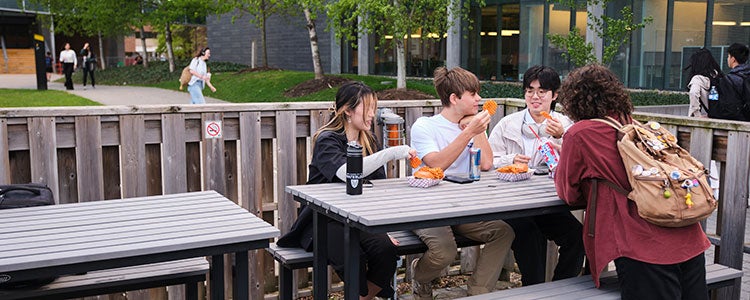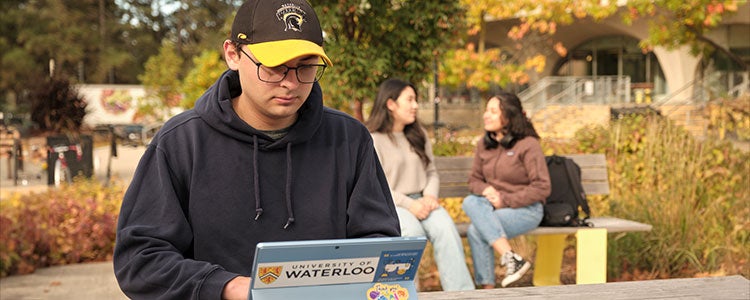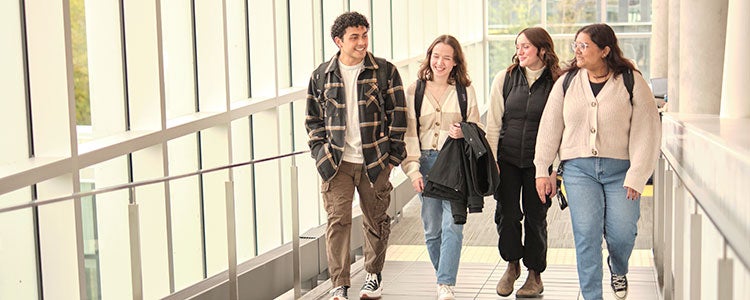
Written by Jacqueline (she/her), student
So, what is university really like?
Getting ready for your first year at university can stir up all kinds of feelings. It can be exciting and a bit scary all at the same time — especially with so many unknowns. Do students party all the time like in the movies? Will you fit in? Will you be chained to your desk studying day and night? I asked 10 Waterloo students to share their assumptions about university before entering their first year. Here’s what I discovered.
Misconceptions regarding social life
There's a party every night
Hollywood films make university seem like an endless party. And for some, that’s what university is. It all depends on what you want to get out of university. If you like to party, chances are you’ll be able to find a gathering of some sort — especially on a Friday night.
But if you’re not the partying type and would rather spend your weekend watching Netflix or reading a book, that’s okay too. You’re not alone. University offers you a lot of freedom and autonomy to make your own choices. But at the end of the day, to stay a university student, you need to make the grade.

I won't make friends or fit in
Six out of the 10 students I talked to said they were worried about making friends and fitting in before coming to Waterloo. It’s a legitimate concern to have. Rest assured, the beauty of being a first-year student is that everyone else is in the same boat as you. You can bond over those first-year jitters and even share a laugh over your worries of not making new friends.
My residence don organized events that made making friends fun and easy.
Some people virtually meet other students in their program or residence through first-year groups on Facebook. Others will make their first university friends during orientation week. This week helps students with the transition and facilitates meeting new people in your program, faculty, and residence.
If you live in residence, many individuals get very close with their floormates. For others, they meet friends in their classes. Just remember, everyone in first year is adjusting to this new life, which makes it that much easier to make friends. Don’t be afraid to start a conversation with a stranger and be open to new experiences.
Related article: Making friends at university
Common worries about academics
I don't need to work hard in my first year
You may think that first year is easy-breezy because you’re taking all introductory courses. Unfortunately, this is not the case for most students. You may have fewer class hours and more free time in university, but you’ll quickly realize that this free time is in fact time you need to prepare for the next day’s classes or work on an assignment.
There’s a lot going on in first year as you adjust to university life, make new friends, and create new routines. First year is a challenging year and time management will be your best friend and aid. This leads me to the next myth…
Related article: Top time management tips for students
University is all work, work, work
Maybe you’re worried about the opposite and are afraid that university will be constant late nights filled with schoolwork. One of the most essential skills for university is time management.
If you manage your time wisely, you’ll have time to do the things you really enjoy. This could be hanging out with friends, baking, working out, or maybe participating in clubs. While there will be times where you feel like the grind never ends, make sure you make time to rest and do things you enjoy so you don’t drain yourself.
Related article: Top 10 best productivity apps for students

I'm on my own when it comes to my academics
You may fear you might not have any resources that provide academic support and that it’s all up to you to figure out how to do everything. If there is one thing I’ve learned about Waterloo in my five years, it’s that there are so many resources out there to help you. The same goes for academic help. There are tutoring services, professors’ office hours, and a variety of workshops such as writing and study skills (just to name a few).
I overcame my fear of not having academic resources available to me by learning about the resources provided by the University. I also learned that your professors do care about whether you do well in your classes, and are willing to help you when you don’t understand concepts
Related article: Ways to counter self-doubt
What if I picked the wrong program or university?
There are so many wonderful things about university. One of them being that it’s a place to discover yourself. While Waterloo offers very specific programs compared to high school, it doesn’t mean you have to stay committed to it.
You may realize that the program you picked doesn’t feel right once you’re in class. Often, if you want to switch programs or faculties within Waterloo, you can do so. Of course, you should talk to your academic advisor because certain programs don’t always allow students to switch.
If you feel like you’re at the wrong university, you can apply to transfer to another university. Once again, your academic advisor is the best person to talk to about making this happen.
Related article: Changing your mind on what to study

Everyone graduates in four years
You might think that because an honours bachelor’s degree in Canada is a four-year program, everyone must finish in four years. That’s not always the case though. A study from the US National Center for Education Statistics found that only 41% of students graduated within four years.
If you’re interested in Waterloo’s co-op program, it will mean automatically adding a fifth year to your studies because of our work/study sequence. It's still a four-year degree but you'll graduate with nearly two years of work experience. Other factors like switching programs or adding minors may make your degree longer than four years. There’s nothing wrong with that though. You should do what best suits your needs.
Related article: What to expect in co-op
So, there you have it — seven common misconceptions about university debunked. What’s most important when it comes to choosing a university is that you take your time, do the research, ask questions, and really get a sense of the university and its programs.
While it’s important to use the viewbooks to compare each university, sometimes going with your gut is what matters most. And don’t let those pesky misconceptions stand in your way of experiencing university.
Related articles

How to find the university that's right for you
When you're starting to think about applying to university, you need to be proactive. That means visiting campuses, speaking to current students, going to information sessions, and even looking at a university's social media channel. If you're trying to decide between universities, here are a few tips that will help you gather all the important information.

10 challenges you may encounter at university
University is an amazing time in your life. There’s the promise of new, exciting experiences, personal growth, and freedom. But it’s not without its own challenges and growing pains.

Seven differences between high school and university
If you’re in high school and planning to go to university, you might be unsure about what you’ve signed up for. What is university going to be like? How will I find my classes? How many people are going to be in my class? For answers to these questions and ma

